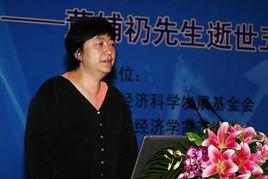人物經歷
1978年,董欣年考入武漢大學生物學系,1982年,獲武大學士 。
參加首屆“中美生物化學聯合招生項目”(CUSBEA,發起人為吳瑞教授),獲得留美資格。丈夫王小凡為在同屆CUSBEA考試中獲得第一名。夫妻雙雙留學美國。
1983年至1988年,就讀於美國西北大學(位於芝加哥),獲得分子生物學理學博士。
1988年至1991年,在哈佛大學醫學院從事博士後研究 。
1992年起,歷任杜克大學生物系助理教授、副教授、教授。
2011年,被推舉為美國科學促進會會士。
2012年,當選為美國科學院院士 。
2014年6月,以中國科學院植物研究所為依託單位入選“中國科學院海外評審專家” 。
個人生活
董欣年教授籍貫是浙江寧波,出身於學術世家。父親是有“一代經濟學泰斗”之稱的董輔礽 。母親劉藹年,是中國著名眼科醫生、教授。一家都是武漢大學校友。其中董輔礽1946年畢業於國立武漢大學,後來成為武大教授和經濟系主任。母親劉氏 1949年畢業於武大,曾是解放軍海軍總醫院眼科主任。有弟董欣中,美國約翰霍普金斯大學神經生物學教授。丈夫王小凡,是董欣年在武大的同學,與董欣年同為杜克大學教授,任教於藥理系。
主要成就
科研成就
董欣年研究植物如何自我防禦病原體以及感染如何發生,尤其關注植物系統獲得性抗性機制,植物抗性與植物生物鐘以及DNA損傷修復的關係,在植物免疫機制研究上取得了一系列開創性的研究成果。
論文專著
Specialties:
Cell and Molecular Biology
Genetics
Genomics
Research Categories: Plant-Microbe interactions
Current projects: (1) Functional analysis of NPR1, a positive regulator of SAR, (2) Functional analysis of SNI1, a negative regulator of SAR, (3) Study of cross-talks between different defense pathways, (4) Study of programmed cell death in plant defense, (5) Expression profiling of plant defense responses, (6) Study of protein secretory pathway in plant defense, (7) Characterization of antifungal proteins in seeds
Research Description: Using Arabidopsis thaliana as a model system, my laboratory studies the mechanisms of plant defense against microbial pathogens. We focus on a specific response known as systemic acquired resistance (SAR). SAR, which can be induced by a local infection, provides the plants with long lasting, systemic resistance against a broad spectrum of pathogens. Salicylic acid (SA; an active ingredient of aspirin) has been found to be the endogenous signal of SAR. Using a genetic approach, our laboratory identified genes involved in the regulation of SAR. Molecular and genetic analyses are being carried out to understand the gene function and to elucidate the SAR signaling pathway. These SAR-regulating genes are also favorite targets for molecular engineering of disease-resistance crops.
Areas of Interest:
signaling transduction mechanisms
plant-microbe interaction
regulation of gene expression
functional genomics
Representative Publications (More Publications) (search)
Wang, W., Barnaby, J. Y., Tada, Y., Li, H., Tör, M., Caldelari, D., Lee, D.-u. Fu, X.-D. and Dong, X., Timing of plant immune responses by a central circadian regulator, Nature, vol. 470 (2011), pp. 110–114 .
Wang, S., Durrant, W. E., Song, J., Spivey, N. W., and Dong X., The Arabidopsis BRCA2 and RAD51 proteins are specifically involved in defense gene transcription during plant immune responses., Proc. Natl. Acad. Sci. USA (2010) [doi] .
SH Spoel, Z Mou, Y Tada, NW Spivey, P Genschik, X Dong, Proteasome-mediated turnover of the transcription coactivator NPR1 plays dual roles in regulating plant immunity., Cell, vol. 137 (May, 2009), pp. 860-72 [abs].
Tada, Y., Spoel, S. H., Pajerowska-Mukhtar, K., Mou Z., Song, J., Dong, X., Plant Immunity Requires Conformational Changes of NPR1 via S-Nitrosylation and Thioredoxins, Science (2008) [8he5p3s6CA6g&keytype=ref&siteid=sci] [abs].
Dong, W., Weaver, N.D., Kesarwani, M., Dong, X., Induction of Protein Secretory Pathway Is Required for Systemic Acquired Resistance, Science, vol. 308 (2005), pp. 1036-1040 .
Mou, Z. Fan, W., and Dong, X., Inducers of plant systemic acquired resistance regulate NPR1 function through redox changes., Cell, vol. 113 (2003), pp. 935 .
Durrant, W. E., and Dong, X., Systemic acquired resistance, Annual Review of Phytopathology, vol. 42 (2004), pp. 185-209 .
Li, X., Zhang, Y., Clarke, J.D., Li, Y., and Dong, X, Identification and cloning of a negative regulator of systemic acquired resistance, SNI1, through a screen for suppressors of npr1-1, Cell, vol. 98 (1999), pp. 329 .
Kinkema, M., Fan, W., and Dong, X., Nuclear localization of NPR1 is required for activation of PR gene expression, Plant Cell, vol. 12 (2000), pp. 2339-2350 .
Zhang, Y., Fan, W., Kinkema, M., Li, Xin, and Dong, X, Interaction of NPR1 with basic leucine zipper protein transcription factors that bind sequences required for salicylic acid induction of the PR-1 gene., Proc. Natl. Acad. Sci. USA, vol. 96 (1999), pp. 6523 .
Clarke, J.D., Volko, S.M., Ledford, H., Ausubel, F.M., and Dong, X., Roles of salicylic acid, jasmonic acid, and ethylene in cpr-induces resistance in Arabidopsis, Plant Cell, vol. 12 (2000), pp. 2175-2190 .
Cao, H., X. Li, and X. Dong, Generation of broad-spectrum disease resistance by overexpression of an essential regulatory gene in systemic acquired resistance., Proc. Natl. Acad. Sci. USA, vol. 95 (1998), pp. 6531-6536 .
Cao, H., J. Glazebrook, J. D. Clarke, S. Volko, and X. Dong., The Arabidopsis NPR1 gene that controls systemic acquired resistance encodes a novel protein containing ankyrin repeats., Cell, vol. 88 (1997), pp. 57-63 .
Cao, H., S. A. Bowling, A. S. Gordon, and X. Dong, Characterization of an Arabidopsis mutant that is nonresponsive to inducers of systemic acquired resistance., Plant Cell, vol. 6 (1994), pp. 1583-1592 .
Durrant, W. E., Wang, S., Dong, X., Arabidopsis SNI1 and RAD51D regulate both gene transcription and DNA recombination during the defense response., PNAS USA, vol. 104 no. 10 (2007), pp. 4223-7 [abs].
D Wang, K Pajerowska-Mukhtar, AH Culler, X Dong, Salicylic acid inhibits pathogen growth in plants through repression of the auxin signaling pathway., Current biology : CB, England, vol. 17 no. 20 (October, 2007), pp. 1784-90 [abs].
Wang, D., Amornsiripanitch, N., Dong, X., A genomic approach to identify regulatory nodes in the transcriptional network of systemic acquired resistance in plants, PloS Pathogens, vol. 2 (2006), pp. 1042-1050 .
SH Spoel, JS Johnson, X Dong, Regulation of tradeoffs between plant defenses against pathogens with different lifestyles., Proceedings of the National Academy of Sciences of the United States of America, United States, vol. 104 no. 47 (November, 2007), pp. 18842-7 [abs].
A. Heidel, J. D. Clarke, J. Antonovics, and X. Dong, Fitness costs of mutants affecting the systemicacquired resistance pathway in Arabidopsis thaliana, Genetics, vol. 168 (2004), pp. 2197-2206 .

